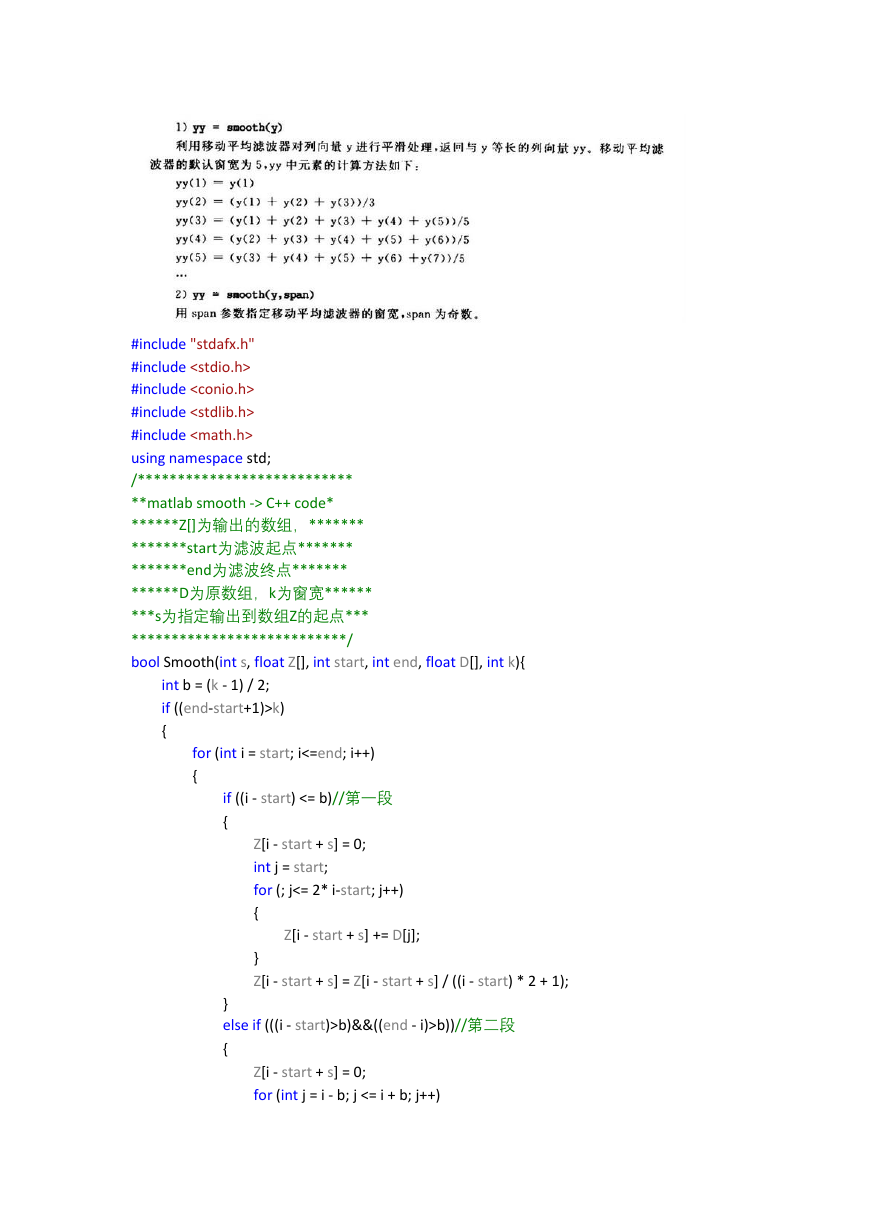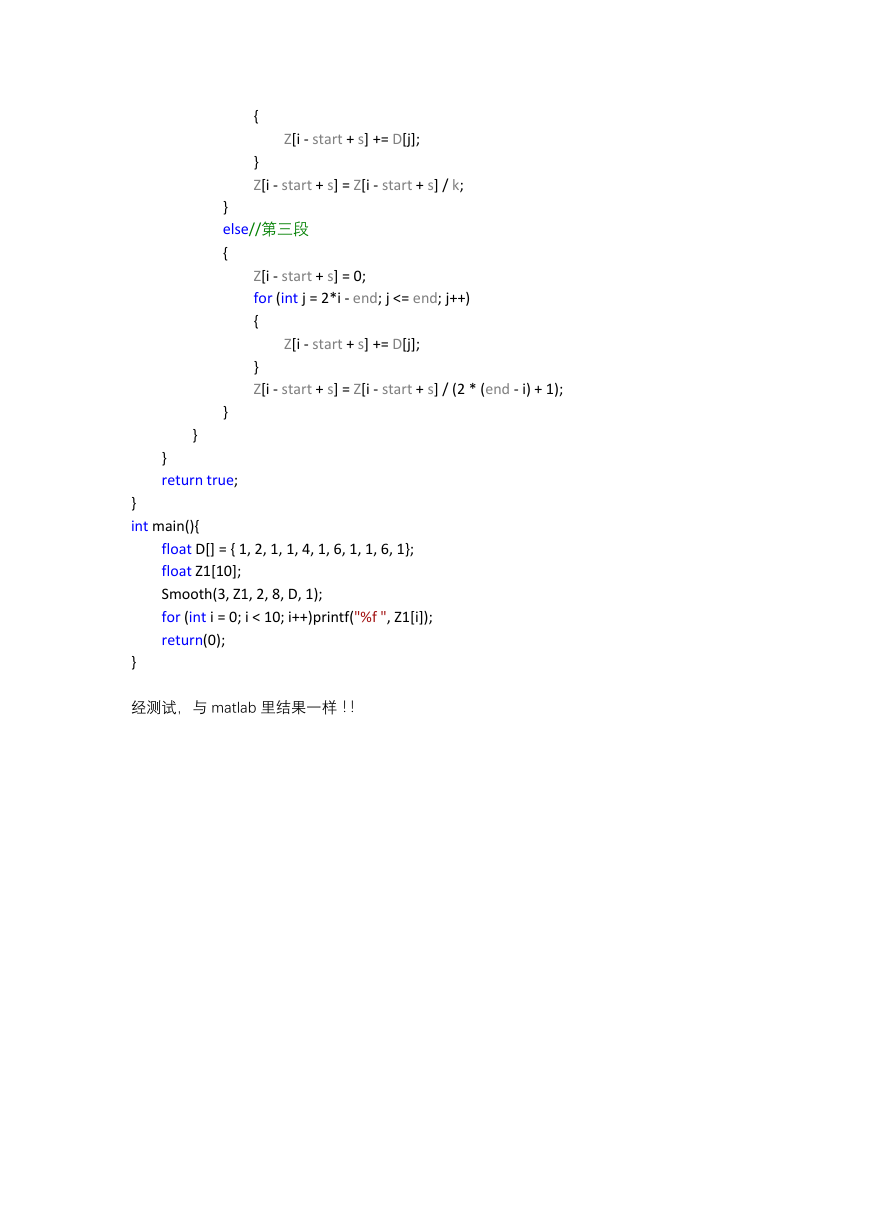#include "stdafx.h"
#include
#include
#include
#include
using namespace std;
/***************************
**matlab smooth -> C++ code*
******Z[]为输出的数组,*******
*******start为滤波起点*******
*******end为滤波终点*******
******D为原数组,k为窗宽******
***s为指定输出到数组Z的起点***
***************************/
bool Smooth(int s, float Z[], int start, int end, float D[], int k){
int b = (k - 1) / 2;
if ((end-start+1)>k)
{
for (int i = start; i<=end; i++)
{
if ((i - start) <= b)//第一段
{
Z[i - start + s] = 0;
int j = start;
for (; j<= 2* i-start; j++)
{
Z[i - start + s] += D[j];
}
Z[i - start + s] = Z[i - start + s] / ((i - start) * 2 + 1);
}
else if (((i - start)>b)&&((end - i)>b))//第二段
{
Z[i - start + s] = 0;
for (int j = i - b; j <= i + b; j++)
�
{
Z[i - start + s] += D[j];
}
Z[i - start + s] = Z[i - start + s] / k;
}
else//第三段
{
Z[i - start + s] = 0;
for (int j = 2*i - end; j <= end; j++)
{
Z[i - start + s] += D[j];
}
Z[i - start + s] = Z[i - start + s] / (2 * (end - i) + 1);
}
}
}
return true;
}
int main(){
float D[] = { 1, 2, 1, 1, 4, 1, 6, 1, 1, 6, 1};
float Z1[10];
Smooth(3, Z1, 2, 8, D, 1);
for (int i = 0; i < 10; i++)printf("%f ", Z1[i]);
return(0);
}
经测试,与 matlab 里结果一样!!
�




 2023年江西萍乡中考道德与法治真题及答案.doc
2023年江西萍乡中考道德与法治真题及答案.doc 2012年重庆南川中考生物真题及答案.doc
2012年重庆南川中考生物真题及答案.doc 2013年江西师范大学地理学综合及文艺理论基础考研真题.doc
2013年江西师范大学地理学综合及文艺理论基础考研真题.doc 2020年四川甘孜小升初语文真题及答案I卷.doc
2020年四川甘孜小升初语文真题及答案I卷.doc 2020年注册岩土工程师专业基础考试真题及答案.doc
2020年注册岩土工程师专业基础考试真题及答案.doc 2023-2024学年福建省厦门市九年级上学期数学月考试题及答案.doc
2023-2024学年福建省厦门市九年级上学期数学月考试题及答案.doc 2021-2022学年辽宁省沈阳市大东区九年级上学期语文期末试题及答案.doc
2021-2022学年辽宁省沈阳市大东区九年级上学期语文期末试题及答案.doc 2022-2023学年北京东城区初三第一学期物理期末试卷及答案.doc
2022-2023学年北京东城区初三第一学期物理期末试卷及答案.doc 2018上半年江西教师资格初中地理学科知识与教学能力真题及答案.doc
2018上半年江西教师资格初中地理学科知识与教学能力真题及答案.doc 2012年河北国家公务员申论考试真题及答案-省级.doc
2012年河北国家公务员申论考试真题及答案-省级.doc 2020-2021学年江苏省扬州市江都区邵樊片九年级上学期数学第一次质量检测试题及答案.doc
2020-2021学年江苏省扬州市江都区邵樊片九年级上学期数学第一次质量检测试题及答案.doc 2022下半年黑龙江教师资格证中学综合素质真题及答案.doc
2022下半年黑龙江教师资格证中学综合素质真题及答案.doc